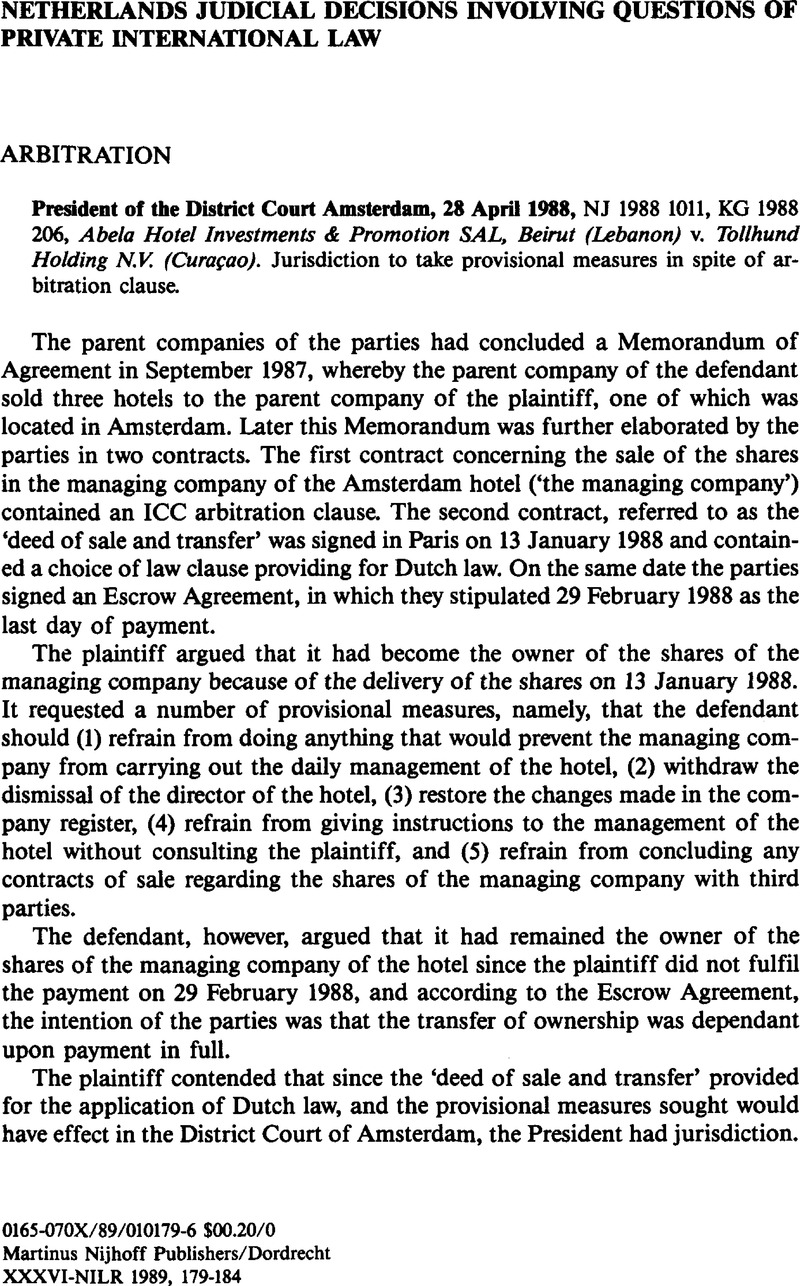No CrossRef data available.
Published online by Cambridge University Press: 21 May 2009

1. Sanders, P. and van den Berg, A.J., The Netherlands Arbitration Act 1986 (1987) p. 29Google Scholar.
2. Memorandum of Reply, reproduced in Tijdschrift voor Arbitrage, No. 4A (August 1984), pp. 37–38.
3. Art. 8(5) ICC Rules does contain a provision concerning provisional measures, but merely states that parties are at liberty to apply to any competent judicial authority for interim or conservatory measures, even under exceptional circumstances after the file has been transmitted to the arbitrators. This provision can, however, be interpreted as meaning that arbitrators may take interim or conservatory measures, and judicial authorities only have jurisdiction in exceptional cases; see, Derains, Y., ‘Observations’, 108 Journal de Droit International (1981) p. 926Google Scholar and 111 Journal de Droit International (1984) pp. 936–937. In any case, arbitrators frequently order provisional measures in ICC arbitrations; see, for example, the awards commented on by Derains, supra.
4. Art. 26(1) UNCITRAL Rules provides: ‘At the request of either party, the arbitral tribunal may take any interim measures it deems necessary in respect of the subject-matter of the dispute, including measures for the conservation of the goods forming the subject-matter in dispute, such as ordering their deposit with a third person or the sale of perishable goods’.
5. It is not certain which article the President had in mind. The Rules of the Dutch Ice Hockey Federation are not very clear in this respect. One might think that Art. 14 creates the possibility of summary proceedings, but what seems to be intended here is ‘speedy arbitration’, that is arbitration on the merits, but with shortened time limits. It is, in fact, Art. 16(3)(b) that deals with provisional measures, and provides that the arbitral tribunal can issue an interim award containing provisional measures.
6. Memorandum of Reply, reproduced in Tijdschrift voor Arbitrage, No. 2 (March/April 1986) pp. 79–81.
7. Sanders, P., Het nieuwe arbitrage recht (1986) p. 122Google Scholar.
8. See, for instance, the Arbitration Rules of the Dutch Council of Construction Companies. Normally, parties have a two-week period during which they may suggest names of possible candidates to the President of the Council, who will take these suggestions into account when he appoints the arbitral tribunal (Art. 10(2)). This article is not applicable, however, when a request for summary proceedings (including provisional measures) is made (Art. 20(2)). If a Tribunal has not been constituted, the President of the Council will immediately appoint arbitrators himself, even by telephone, solely for the purpose of the summary proceedings. Afterwards, if a decision on the merits is still required, a new arbitral tribunal will be constituted, in accordance with the provision of Art. 10(2).